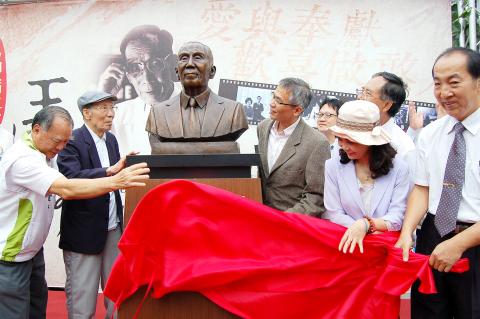The Greater Tainan Government unveiled a bronze bust of Wang King-ho (王金河), a famed doctor popularly known as the “Father of Blackfoot Disease,” on National Doctors’ Day on Nov. 12.
The statue was a project of the city’s Tourism Bureau to honor Wang for his work in combating blackfoot disease, a condition caused by drinking arsenic-contaminated well water. The bust was installed at the Taiwan Blackfoot Disease Socio-Medical Service Memorial Park in Beimen District (北門), where Wang used to have his clinic.
Although some locals have expressed mixed feelings about the event — because of the customary practice of honoring someone with a statue only if the individual has passed away — Wang, 98, said he did not feel that the statue was a curse, adding that he was enjoying the occasion.

Photo: Yang Chin-cheng, Taipei Times
“I didn’t really do any great work. Actually, I feel guilty because the local government had to go through all the trouble of carving and producing this bronze sculpture for me,” he said modestly. “Anyway, I like it.”
“It looks a lot like me, very handsome,” Wang said.
The bust was made by bronze master Hsiao Chi-lang (蕭啟郎), who highlighted Wang’s esteemed attributes of benevolence and generosity in medical service.
Wang’s eldest son, Wang Chao-lung (王朝龍), said the idea of having a bust of his father did feel odd at first, but he later decided not to refuse the bureau’s good intention.
Greater Tainan Tourism Bureau Director Julian Chen (陳俊安) said the bust “is to salute Wang King-ho’s lifetime’s work on blackfoot disease.”
“His dedication and sacrifice for the cause is like the spirit of Albert Schweitzer [doctor and Nobel Peace Prize winner] for people in southern Taiwan. The Tainan government wants to commemorate his great deeds and dedication for future generations to remember,” Chen said.
Guided tours and information displays at the memorial park, along with Wang King-ho’s bust, give visitors a better understanding of the history and medical developments in blackfoot disease, as well as the doctor’s unselfish service to society, he added.
With the aid of the Mustard Seed Mission, a Christian charity, Wang King-ho set up a free clinic for the treatment of blackfoot disease in the then-Beimen Township in 1960.
That began his more than 25 years of practice mainly dedicated to the treatment of blackfoot disease. At one time, the clinic took in more than 80 patients who lived and were treated for free at the clinic.
For patients who died destitute, Wang King-ho also helped pay for their funeral expenses.
After World War II, Wang King-ho was elected the first township chief of Beimen, and went on to serve two terms on the then-Tainan county council.
Wang is also a recipient of the Lifetime Medical Service Award and Outstanding Tainan Citizen Award for his work.

Nipah virus infection is to be officially listed as a category 5 notifiable infectious disease in Taiwan in March, while clinical treatment guidelines are being formulated, the Centers for Disease Control (CDC) said yesterday. With Nipah infections being reported in other countries and considering its relatively high fatality rate, the centers on Jan. 16 announced that it would be listed as a notifiable infectious disease to bolster the nation’s systematic early warning system and increase public awareness, the CDC said. Bangladesh reported four fatal cases last year in separate districts, with three linked to raw date palm sap consumption, CDC Epidemic Intelligence

The manufacture of the remaining 28 M1A2T Abrams tanks Taiwan purchased from the US has recently been completed, and they are expected to be delivered within the next one to two months, a source said yesterday. The Ministry of National Defense is arranging cargo ships to transport the tanks to Taiwan as soon as possible, said the source, who is familiar with the matter. The estimated arrival time ranges from late this month to early next month, the source said. The 28 Abrams tanks make up the third and final batch of a total of 108 tanks, valued at about NT$40.5 billion

Two Taiwanese prosecutors were questioned by Chinese security personnel at their hotel during a trip to China’s Henan Province this month, the Mainland Affairs Council (MAC) said yesterday. The officers had personal information on the prosecutors, including “when they were assigned to their posts, their work locations and job titles,” MAC Deputy Minister and spokesman Liang Wen-chieh (梁文傑) said. On top of asking about their agencies and positions, the officers also questioned the prosecutors about the Cross-Strait Joint Crime-Fighting and Judicial Mutual Assistance Agreement, a pact that serves as the framework for Taiwan-China cooperation on combating crime and providing judicial assistance, Liang

A group from the Taiwanese Designers in Australia association yesterday represented Taiwan at the Midsumma Pride March in Melbourne. The march, held in the St. Kilda suburb, is the city’s largest LGBTQIA+ parade and the flagship event of the annual Midsumma Festival. It attracted more than 45,000 spectators who supported the 400 groups and 10,000 marchers that participated this year, the association said. Taiwanese Designers said they organized a team to march for Taiwan this year, joining politicians, government agencies, professionals and community organizations in showing support for LGBTQIA+ people and diverse communities. As the first country in Asia to legalize same-sex